
Five out of six N.A. Automakers' Scores drop in Annual Supplier Working Relations Study
DETROIT, May 14, 2018 /PRNewswire/ -- Five of the six major automakers manufacturing and selling vehicles in North America fell in their annual supplier relations rankings, according to the results of the 18th annual North American Automotive OEM - Supplier Working Relations Index® Study conducted by Planning Perspectives, Inc., Birmingham, MI.
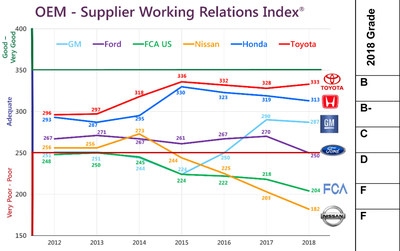
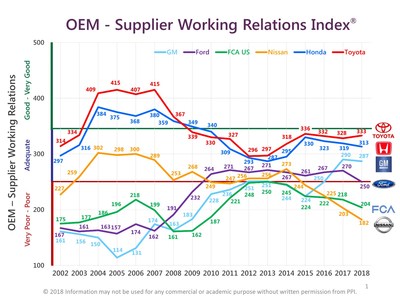
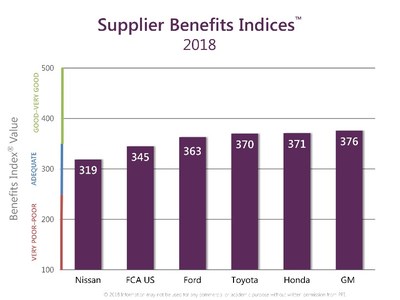
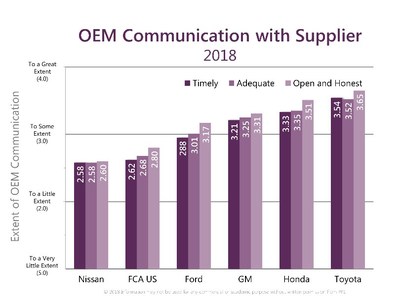
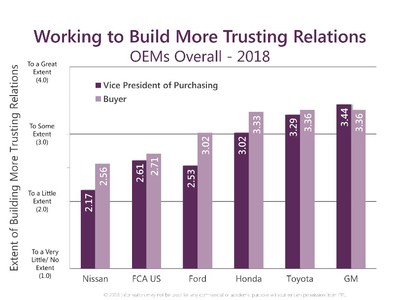
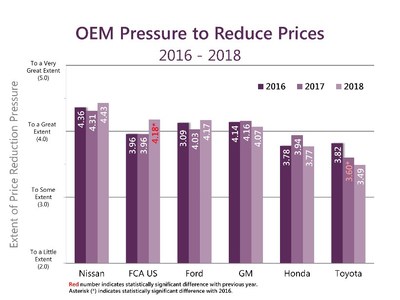
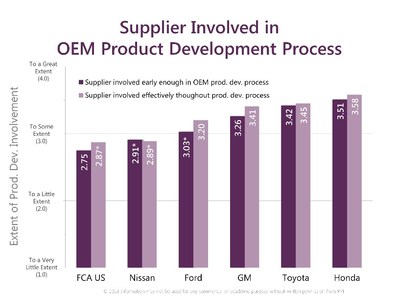
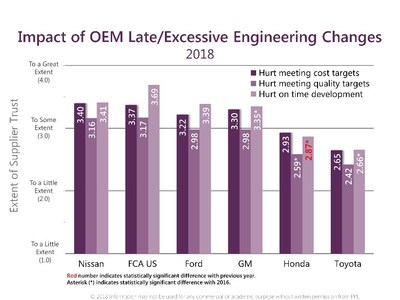
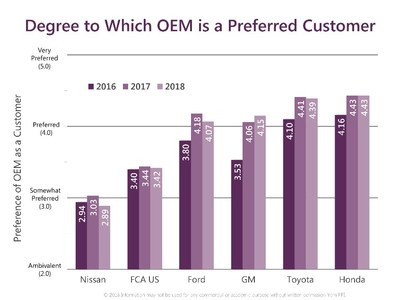
The annual study shows Nissan in last place, continuing its dramatic four-year slide to its all-time low in supplier relations since the study began in 2002. That's significantly below FCA US in fifth place which also continued its downward slide to its lowest ranking in eight years. Ford, after eight years of mixed results, fell to the borderline of Poor relations, its lowest point in nine years.
General Motors, after a two-year dramatic improvement that enabled it to overtake Ford for third place, fell slightly this year. Honda continued its gradual three-year decline. Only Toyota ticked upward slightly after declining for two years, holding onto first-place and continuing to distance itself from second-place Honda.
"The erratic up-and-down year-over-year trend lines suggest that these automakers either don't have a comprehensive supplier relations program in place, or their programs are poorly executed, and it's costing them hundreds of millions of dollars because suppliers contribute about 60 percent to an automaker's gross profits," said John Henke, president of Planning Perspectives. "A well-managed supplier relations program directly impacts the automakers' profits.
"For example, our economic model shows that if GM simply maintained its 2017 ranking rather than dropping 3 points this year, it would have realized an additional $167 for every light vehicle manufactured and sold in N.A. This isn't a lot of money, except that GM manufactured and sold more than 2.4 million light vehicles in N.A. which amounts to more than $400 million in profit. Likewise, had Ford maintained its 2017 level, it would have gained even more -- $600 million in profit."
Henke's two-decades of research into OEM buyer-supplier relations has shown a direct correlation between supplier relations and what the supplier provides the OEM in terms of pricing, technology and support.
Cost, of course, is important to an OEM, and Henke's research shows the better the relations with an OEM customer, the greater the price concessions the supplier gives to them. More importantly, the OEM also receives greater non-price benefits such as increased investment in new technology by the supplier, more sharing of new technology, 'A' Team supplier support, and more and better supplier communication that can help avoid and resolve problems more quickly.
Supplier relations are not that difficult to understand, says Henke. "Like any relationship, supplier relations come down to how well you communicate, how fair and respectful you are to the other party, and being trustworthy, which includes doing what you say you will do. The real challenge comes in executing and managing the complexities of the program."
The Working Relations Index® scores automakers on 16 variables, which fall into five broad areas: OEM-Supplier Relationship, OEM Communication, OEM Help, OEM Hindrance (reverse measure), and Supplier Profit Opportunity.
Following are more highlights from the study that show management and buyer actions and their consequences, both positive and negative:
- SUPPLIER BENEFITS TO OEMS (see image): Because of its generally improving relations with suppliers, GM ranks highest (376) in terms of the benefits it receives from suppliers, followed closely by Honda (371) and Toyota (370). Ford is fourth (363). FCA US is fifth (345) and Nissan is a distant sixth (319). According to the study, Nissan and FCA US received "significantly" less benefits from suppliers.
- OEM COMMUNICATION (see image): Communication has three components: Timeliness, Adequacy and Open & Honest. Looking at the latter, Toyota (3.65) and Honda (3.51) ranked one and two, respectively, followed closely by GM (3.31). Ford was fourth (3.17) followed by FCA US (2.80) and Nissan (2.60). Ford's drop in all three communication measures this year was an important contributor to its 20-point decline in its Working Relations ranking.
- MANAGEMENT vs BUYERS (see image): In working to build trusting relations, GM's vice president of purchasing is ranked highest followed by the VPs at Toyota and Honda. In terms of buyers, GM and Toyota are perceived to be doing the best job, followed by Honda which is only three points lower. But, the greatest gap between the VP and buyers is at Ford (49 points), Nissan (39) and Honda (31), suggesting a growing disconnect between the executive leadership and their buyers.
- TRUST: In overall trust, Toyota (3.63) and Honda (3.51) both dropped but are still one and two respectively, while GM (3.21) continues to improve in the third spot. Ford (3.05) is fourth. FCA US (2.72) and Nissan (2.39) finished well behind and are fifth and sixth, respectively
- RESOLVING PAYMENT & TOOLING PAYMENT ISSUES QUICKLY & FAIRLY: In terms of results, the six automakers are grouped in three nearly equal pairings: Honda and Toyota are first and second, respectively; GM and Ford are third and fourth; with Nissan and FCA US, last. Each of these OEM groups is significantly different than the other two.
- PRESSURE TO REDUCE PRICES (see image): Toyota suppliers experienced the least pressure to reduce prices (3.49), followed by Honda (3.77) and GM (4.07). Ford (4.17) and FCA US (4.18) are close behind. Suppliers felt the greatest pressure to reduce prices at Nissan (4.43). Interestingly, this pressure has no impact on supplier relations.
- OEM PRODUCT DEVELOPMENT (see image): A supplier's involvement in and throughout the OEM's product develop process is key to controlling cost, quality and on-time delivery. Honda did the best job this year, followed by Toyota and GM. Nissan was fifth and FCA US, last.
- IMPACT OF ENGINEERING CHANGES (see image): The number of late or excessive engineering changes impacts a supplier's contribution to the OEM in three important ways: cost, quality and time. Toyota is best at managing engineering changes and is ranked number one as having the least changes, followed by Honda. GM and Ford are ranked in the middle, and FCA US and Nissan are last.
- MOST PREFERRED CUSTOMER (see image): Given the above results, it is not difficult to understand why. For the third year running Honda and Toyota are the most preferred OEMs to do business with, followed by GM and then Ford. Nissan and FCA US continue to be the least preferred customers, significantly behind the four other OEMs.
"Based on the results of the study, it would seem the automakers have forgotten the value and financial impact of strong, positive, collaborative supplier relations," said Henke. "If this was clearly understood, there is no question the OEMs' top management and boards of directors would be much more focused on supplier relations improvement.
"Poor supplier relations mean significant reductions in suppliers' contribution to OEM profits, and with the uncertain future facing automakers in terms of technology, market dynamics, and increasing global competition, each OEM is going to need all the revenue and profits it can generate."
About the Study. Now in its 18th year, the Annual North American Automotive OEM-Tier 1 Supplier Working Relations Index® Study was conducted from early March to mid-April. Respondents are 684 sales persons from 496 Tier-1 suppliers, representing 62% of the six OEMs' annual buy, participated in the Study. The sales personnel provided data on 2,024 buying situations (e.g., supplying brake systems to FCA US, tires to Toyota, seats to GM). Demographically, the supplier-respondents represent 44 of the Top 50 NA suppliers and 77 of the Top 100 NA suppliers.
The annual study tracks supplier perceptions of working relations with their automaker customers in which they rate the US and Japanese automakers across the six major purchasing areas broken down into 14 commodity areas. The results of the study are used to calculate the WRI® which can then be used to calculate the economic value of working relations based on a proprietary PPI-developed economic model. The economic model is based on the suppliers' price and non-price contributions to the automakers' profits. WardsAuto provided data on the automakers N.A. annual light vehicle production and sales for use in the model. For more information, visit PPI at www.ppi1.com or phone +1.248.644.7690.
SOURCE Planning Perspectives, Inc.

Share this article